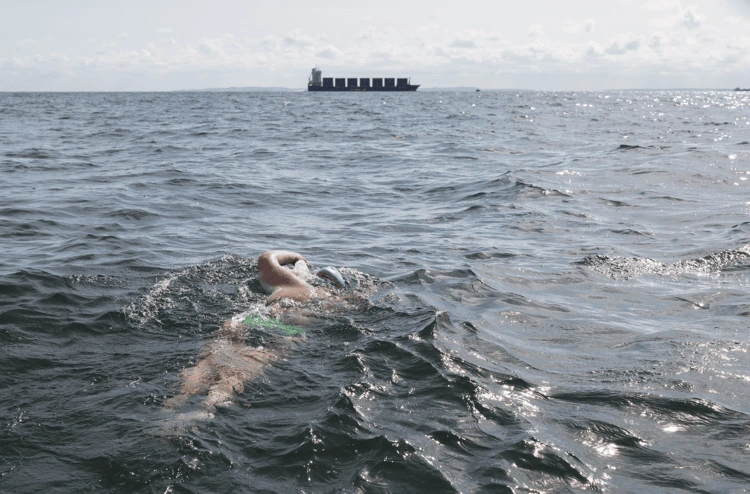

As fish stocks dwindle and traditional livelihoods vanish, a new kind of journey is keeping boats afloat
Report by Bryony Cottam, photographs by Emma Khan
Sophie Smith had never thought about swimming the English Channel, much less believed she was capable. Then, in 2020, with public pools still shut in the wake of the first Covid-19 lockdown, she began taking her two young boys to play in the waves at Swansea Bay. One calm day, she went for a swim. ‘The next thing I know, about seven months later, I’m on a team of people doing a relay crossing of the English Channel.’
The team had a terrible time. A gale was blowing, thick fog shrouded the swimmers all day and two of the women battled seasickness. Smith, who was sure the attempt would be called off, says she was ‘absolutely terrified’ of the leap from the bay to the shipping lanes.
But after completing the swim – against all the odds – the team’s pilot, Stuart Gleeson, approached Smith alone. ‘He said, “If you ever want to do a solo, I’ll take you.” And I said, “Don’t be so ridiculous! There’s no way I could do that.”’ Less than 12 months later, she did.
Enjoying this article? Check out our related reads:
In the corner of the boat’s small wooden cabin, among blankets and an array of torches, Gleeson sets a silver kettle down on a small stove. ‘Once you get into the shipping lanes,’ he explains, ‘you’ve got the boats to deal with – you’ve got ferries, possibly migrant boats, and other services going about as well. But we deal with all the navigation, the weather, all that. All the swimmer is really focusing on is the side of the boat.’
Gleeson has been a pilot (licensed to navigate specific waterways) for Channel swimmers for 15 years. It’s his job to escort swimmers from the pebble beach at Samphire Hoe – a 30-hectare nature reserve to the west of Dover and the starting point for most Channel swims – to Cap Gris-Nez in northern France. The shortest distance, swum in a straight line, is 34 kilometres – but that’s not accounting for the tides. The average successful attempt takes 13 hours and 24 minutes. The longest took nearly 39 hours – a feat achieved by British swimmer Jackie Cobell, who swam 105 kilometres to reach the French coast.

At just eight years old, Gleeson made his first Channel crossing while escorting a swim attempt aboard his uncle’s fishing boat. He later bought his own sports fishing boat – now moored alongside five others in Dover’s new marina – to lead fishing trips for angling parties. Today, all of his passengers are Channel swimmers. So are those of the neighbouring boats.
Folkestone’s fishing museum is tucked away under the brick arches by the town’s harbour. The space inside is cluttered from ceiling to floor with ropes, nets and buoys, glass cabinets full of ledgers and wall upon wall of black-and-white photographs – a time capsule of a town founded on the fishing industry.
‘In its heyday,’ explains an elderly museum volunteer, ‘there were 60 boats operating out of the harbour. Now, there are only seven left.’ Among the grainy images of boats and well-weathered fishermen, a small handful of large colour portraits feature men in bright blue or yellow overalls – today’s fourth-, fifth-, even sixth- generation fishermen. In one image, Peter Reed, a fourth-generation fisherman himself, stands proudly next to his two sons, Arun and Zak.
In Folkestone’s harbour, the low tide has left the fishing boats marooned in the mud where they are moored. Reed points out his boat, freshly painted ahead of the swimming season. He still fishes – mainly for lobsters and whelks – but, come summertime, swimming becomes a priority. ‘Without swimming, we would struggle to survive.’
Reed recalls that by the time he started fishing at 14, his grandfather was already lamenting how much things had changed. ‘He’d say you could have chucked a bucket over the side of the boat and scooped up the fish – there used to be so much there.’
Back then, winters were the primary earning season. Reed and his grandfather would set a few lobster and whelk pots just to get through the summer, knowing winter would bring more than 1,000 kilos of cod in a single trip. ‘You can pretty much write off most winters now,’ he says. ‘It’s okay through the summer, but it’s getting in debt through the winter and then basically never catching up. Cod was our mainstay – and that’s gone.’

Many of the Southeast’s inshore fishermen have moved into similar lines of work – running tugs, providing offshore windfarm support, or working in ports. Others have thrown in the towel completely. ‘I don’t think many people have realised how bad it’s got,’ Reed says. ‘Take Luke Noakes – one of the ones that would just keep going until he couldn’t go anymore. He packed up last year.’
Surveys show that the average age of the UK’s fishing fleet is rising. The average employee is now 44, and vessel owners are typically in their 50s. ‘My dad paid off his mortgage and kept going until he was 67 – but now you can’t,’ says Reed. ‘You wouldn’t expect any youngsters to want to come into the game. Why would you want to come fishing and struggle to earn £300–400 a week on a good week? You just can’t make a living out of it. It’s all down to the big trawlers,’ he adds.
On 9 July, Smith reached the beach at Salt Pans Bay in western Scotland. She’d left the Gobbins, in Northern Ireland, 15 hours earlier. Now an ‘Original Triple Crown’ holder – a title for those who complete each of the English, Bristol and North Channel crossings – she credits Gleeson with giving her a much-needed initial push. ‘My default feelings,’ she adds, ‘tend to be, “I’m not good enough.” Sometimes you need people to say, “Actually, you might not believe in yourself, but we do.” And I had that relationship with Stuart.’
This year marks the 150th anniversary of the Channel Swimming Association and, today, people come from all over the world to swim the Channel. It’s so popular that neither Reed nor Gleeson can keep up with demand – available swim slots are booked up as soon as they’re released. For them, the work has been a lifeline. It also offers the job satisfaction they lost when fishing collapsed.
‘I do still enjoy fishing when it’s good,’ says Reed.
‘The thing is, every time you do a Channel swim, you’re making someone’s dream come true.’ Gleeson agrees that his new role means more to him than the money. ‘I don’t pick and choose who I take – they could be the CEO of a multi-million-pound company, or they could be a local dustman. It doesn’t matter who they are when they come to do this – and that’s what I like about the job.’





